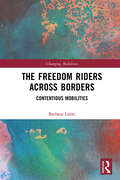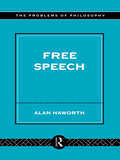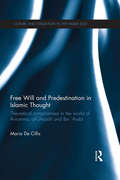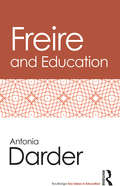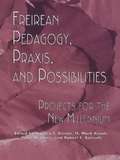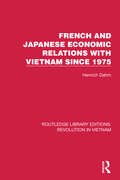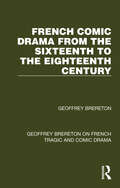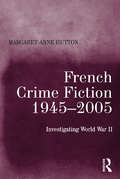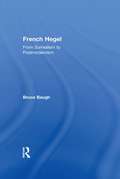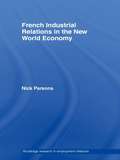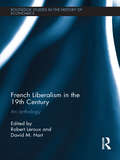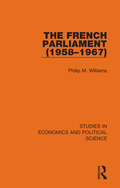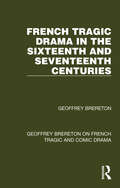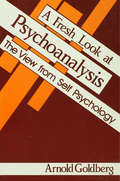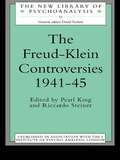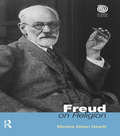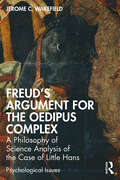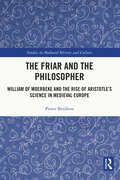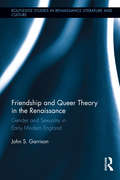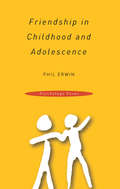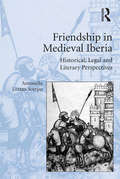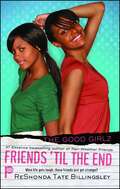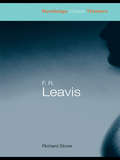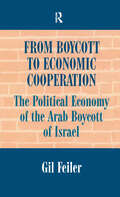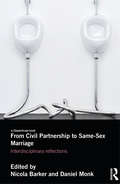Special Collections
Benetech’s Global Certified Accessible Titles
Description: Benetech’s GCA program is the first independent third-party EPUB certification to verify ebook accessibility. By creating content that is born accessible, publishers can meet the needs of all readers. Learn more: https://bornaccessible.benetech.org/
- Table View
- List View
The Freedom Riders Across Borders
by Barbara LüthiThe Freedom Riders Across Borders: Contentious Mobilities provides the first comprehensive transnational historical analysis of the Freedom Rides. It explores the transnational history of these social movements and the struggles for the right to mobility and other civil rights in the United States of America, Australia, and Palestine between 1961 and 2011. This book makes a significant contribution to the transnational studies of social movements and the burgeoning field of mobility studies by investigating the specific constellations of mobility as historically and geographically specific formations of movement as well as investigating how the images, ideas and strategies of Freedom Riders were adapted, translated, and moved across time and space. Foremost, this book speaks to the pressing questions of the past and present concerning the politics and inequalities of mobilities impacting different social groups in different ways. From a historical perspective, it gives answers to the intensified interest and questions concerning the dynamics, techniques and "contentious politics" of social movements in a globalized environment. The book details how the question of mobility has come to constitute political conflict and protest over norms, restrictions, and representations. It shows not only that mobility is a differentially accessed resource which shapes and is shaped by political processes, but also that contestation is an equal part of forming mobility. The book identifies vehicles as a mobile site of contestation and, in the context of the Freedom Rides, as a site of strategic political action. In doing so, Lüthi makes a persuasive case for mobility to be given a central place in the study of progressive social movements. As such, this book will be of great interest to researchers in a number of disciplines, including history, geography and sociology.
Free Speech
by Alan HaworthFree Speech is a philosophical treatment of a topic which is of immense importance to all of us.Writing with great clarity, wit, and genuine concern, Alan Haworth situates the main arguments for free speech by tracing their relationship to contemporary debates in politics and political philosophy, and their historical roots to earlier controversies over religious toleration.Free Speech will appeal to anyone with an interest in philosophy, politics and current affairs.
Free Will and Predestination in Islamic Thought
by Maria De CillisThe subject of "human free-will" versus "divine predestination" is one of the most contentious topics in classical Islamic thought. By focusing on a theme of central importance to any philosophy of religion, and to Islam in particular, this book offers a critical study of the intellectual contributions offered to this discourse by three key medieval Islamic thinkers: Avicenna, al-Ghāzālī and Ibn ʿArabī. Through investigation of primary sources, Free Will and Predestination in Islamic Thought establishes the historical, political and intellectual circumstances which prompted Avicenna, al-Ghāzālī and Ibn ʿArabī’s attempts at harmonization. By analysing the theoretical and linguistic ‘techniques’ which were employed to convey these endeavours, this book demonstrates that the three individuals were committed to compromise between philosophical, theological and mystical outlooks. Arguing that the three scholars’ treatments of the so-called qaḍā wa’l-qadar (decree and destiny) and ikhtiyār (free-will) issues were innovative, influential and fundamentally more complex than hitherto recognized, this book contributes to a fuller understanding of Islamic intellectual history and culture and will be useful to researchers interested in Islamic Studies, Religion and Islamic Mysticism.
Freire and Education
by Antonia DarderOne of the most influential educational philosophers of our times, Paulo Freire contributed to a revolutionary understanding of education as an empowering and democratizing force in the lives of the disenfranchised. In this deeply personal introduction to the man and his ideas, Antonia Darder reflects on how Freire’s work has illuminated her own life practices and thinking as an educator and activist. Including both personal memories and a never-before published, powerful dialogue with Freire himself, Darder offers a unique "analysis of solidarity," in mind and spirit. A heartfelt look at the ways Freire can still inspire a critically intellectual and socially democratic life, this book is certain to open up his theories in entirely new ways, both to those already familiar with his work and those coming to him for the first time.
Freireian Pedagogy, Praxis, and Possibilities
by Peter McLaren and Stanley S. Steiner and H. Mark Krank and Robert E. BahruthScholar, activist, and educator Paulo Freire was one of the first thinkers to fully appreciate the relationships between education, politics, imperialism, and liberation. This volume is a testament to the works of Paulo Freire in the field of Education as well as the life of the man: a "story of courage, hardship, perseverance, and unyielding belief in the power of love." In this comprehensive collection, prominent intellectuals including Noam Chomsky and Donald Macedo reflect on Freire's "politics of liberation" and add important new dimensions to the revolutionary, innovative ideas that Freire bequeathed to a generation much in need.
French and Japanese Economic Relations with Vietnam Since 1975
by Henrich DahmThis book, first published in 1999, compares the strategies of France and Japan in trying to win economic and political influence in the newly emerging Vietnam, which opened to the international community only after the Vietnamese Communist Party had started economic reforms in 1986. These reforms are aimed at transforming the country’s centrally-planned economy into a government-controlled market economy and at opening Vietnam to foreign capital, technology and know-how. This setting provides a unique opportunity for comparing the strategies of two nations from different continents in conducting their economic relations with a unified Vietnam.
French Comic Drama from the Sixteenth to the Eighteenth Century
by Geoffrey BreretonIn tracing the course of French comedy from the Renaissance, through the age of Louis XIV and the eighteenth century, to the eve of the Revolution, originally published in 1977, Geoffrey Brereton shows how it evolved from the crude farces and experimental plays of the sixteenth century to become a rich and highly sophisticated dramatic genre. The main emphasis is on the work of the principal dramatists, notably Molière (whose plays and career are given a detailed and enlightening treatment), Corneille, Scarron, Marivaux and Beaumarchais, with some space devoted to the more neglected writers, such as the ‘cynical generation’ of Dancourt, Regnard, Lesage and others; and all the plays are seen in the context of the theatrical conventions that helped to shape them. Different types of comedy are analysed, including comedy of character and of manners, as well as the romantic, burlesque and bourgeois forms and the development of the opéra-comique. At the same time Dr Brereton examines the influences on French comedy – influences as varied as those of the farce, the Italian commedia dell’arte, the Spanish comedia and the eighteenth century drame – and the way in which these were absorbed and exploited by French comic dramatists. Since comedy, more than any other kind of drama, reflects the contemporary social scene, attention is drawn to social conditions and attitudes, and some of the more striking parallels with modern social preoccupations are pointed out. Written in a very lively and readable style, and containing much stimulating and original comment, as well as providing the basic facts, it gives a considerable insight into the nature of French comedy during its most formative and fruitful period. A substantial bibliography and other reference material increase the usefulness of this book to the student of French drama.
French Crime Fiction, 1945–2005
by Margaret-Anne HuttonIn the first major study of representations of World War II in French crime fiction, Margaret-Anne Hutton draws on a corpus of over a hundred and fifty texts spanning more than sixty years. Included are well-known writers (male and female) such as Aubert, Simenon, Boileau-Narcejak, Vargas, Daeninckx, and Jonquet, as well as a broad range of lesser-known authors. Hutton's introduction situates her study within the larger framework of literary representations of World War II, setting the stage for her discussions of genre; the problem of defining crimes and criminals in the context of the war; the epistemological issues that arise in the relationship between World War II historiography and the crime novel; and the temporal textures linking past crimes to the present. Filling a gap in the fields of crime fiction and fictional representations of the War, Hutton's book calls into question the way both crime fiction and the French theatre of World War II have been conceptualized and codified.
French Hegel
by Bruce BaughFirst published in 2003. Routledge is an imprint of Taylor & Francis, an informa company.
French Industrial Relations in the New World Economy
by Nick ParsonsExamining the traditionally predominant role of the state in shaping employment patterns and social policy in France, French Industrial Relations in the New World Economy analyzes the impact of globalization on French industrial relations. Looking at the changing economic context of industrial relations, this important text places particular emphasis on the notion of a shift from a national, Fordist form of employment regulation, to an international, post-Fordist form - examining in detail the impact of this shift on the role of the French state and on the balance of power between employer and trade union organizations. Including chapters on employer organizations, collective bargaining, the role of the state, and workplace representation, French Industrial Relations in the New World Economy explores this fascinating topic in detail and provides a detailed resource for postgraduates studying trade unions, industrial and employee relations, and industrial studies in general.
French Liberalism in the 19th Century
by David M. Hart and Robert LerouxPolitical and economic liberalism has generally been considered to be of marginal import in France, but at an intellectual level, it is a different story. An exploration of the history of French economic thought shows how a rich intellectual tradition developed during the nineteenth century, which has been previously neglected in English language studies of French thinking. In this important new collection, Robert Leroux brings together key works, both from widely regarded and lesser known authors, whose thinking constituted the core of a singular intellectual movement. These include such figures as Charles Dunoyer, Joseph Garnier, Gustave de Molinari, Yves Guyot, Alexis de Tocqueville, Benjamin Constant and Frédéric Bastiat. Including several works that have never before been published in English, this anthology begins with a full introduction that provides an overview of liberal thought in the nineteenth century, and each text is preceded by a biographical note on the author, and an explanation of the wider significance of the text. This anthology, by bringing to the fore a number of writers and doctrinal positions, seeks to give a coherence, an overall cast to French liberalism without exaggerating its unity. It will be of interest to economists, political scientists, historians, philosophers and sociologists alike.
The French Parliament
by Philip M. WilliamsOriginally published in 1968, this book set out to give a brief but complete account of the French Parliament as it had worked in practice since the advent of President de Gaulle. A number of different aspects are discussed, from the social background of the members to the debates on five sample bills, and from the strategy of pressure groups to the organisation and character of the Gaullist party (about which very little had been written). While the legal framework within which the new parliament works is comprehensively described, attention is mainly focused on a political situation transformed by the end of the Algerian war and by the speed of social change in France itself at the time. Earlier books on the Fifth Republic naturally concentrated heavily on the spectacular crises of its early years and on the exceptional personality of its president. Remarkably little, therefore, had been written on the recent development of its institutions and politics in the peacetime conditions which France had enjoyed since 1962 for the first time for over twenty years. There was a Gaullist myth that the new regime had reformed the system and, against the obstructive opposition of an Opposition which had learned nothing and forgotten nothing, had won the support of the French people for a strong democratic government on British lines. There was a corresponding Opposition myth that a ruler and party of authoritarian temper had consolidated their power by reducing parliamentary criticism to an impotent farce. Neither interpretation was wholly unfounded; neither does justice to the complex reality which this work tries to explain as fairly as possible.
French Tragic Drama in the Sixteenth and Seventeenth Centuries
by Geoffrey BreretonOriginally published in 1973, the history of French tragedy and tragicomedy from their origins in the sixteenth century to the last years of Louis XIV’s reign is here surveyed in a single volume. Beginning with a brief account of the development of drama from the Middle Ages to the Renaissance, Dr Brereton examines the plays as types of drama, the circumstances in which they were produced and their reception by contemporaries. The traditionally great figures of Corneille and Racine are treated at some length, but their work is seen in perspective against the plays of their predecessors and of their own time. Garnier and Montchrestien are discussed, among others, as notable writers of Renaissance humanist tragedy. Sections are devoted to secondary but still important dramatists such as Mairet, Rotrou, Du Ryer, Tristan L’Hermite, Thomas Corneille and Quinault. A long chapter on Alexandre Hardy reviews the work of this neglected author and stresses his interest as a transitional link between the two centuries and as a vigorous pioneer of a type of drama which flourished for several decades after him concurrently with French ‘classical’ tragedy. The main currents of critical theory, social attitudes and stage history are described in their relation to the development of the drama. Well over a hundred plays are discussed or summarized; and the author has constantly referred back to the original material and has avoided an over-simplification of a vast subject which contains more exceptions and anomalies than has generally been recognized in the past. Chronological tables of the works of major dramatists, summaries of numerous plays and a bibliography containing modern editions of plays are included.
A Fresh Look at Psychoanalysis
by Arnold I. GoldbergGoldberg uses the questions posed by self psychology as point of entry to a thoughtful consideration of issues with which every clinician wrestles: the scientific status analysis, the relationships among its competing theories, the role of empathy in analytic method, and the place of the "self" in the analyst's explanatory strategies. Clinical chapters show how the notion of the self can provide organizing insights into little-appreciated character structures.
The Freud-Klein Controversies 1941-45
by David Tuckett and Pearl King and Riccardo SteinerFollowing Freud's death in 1939, the radical theories of Melanie Klein were the subject of prolonged controversy and fierce debate within the British Psychoanalytical Society. At the time, individuals fought passionately in support of their positions. In the midst of, or as a result of, the personal animosities and political manoeuvrings, important intellectual contributions were made, and practical decisions taken, which were to affect the development of psychoanalysis down to the present day. The Freud-Klein Controversies 1941-45 offers the first complete record of the debate, including all relevant papers and correspondence, based on previously closed archive material which is presented without censorship.
Freud on Religion
by Marsha Aileen HewittFreud argued that religions originate in the unconscious needs, longings and fantasies of human minds. His work has served to highlight how any analysis of religion must explore mental life, both the cognitive and the unconscious. 'Freud on Religion' examines Freud's complex understanding of religious belief and practice. The book brings together contemporary psychoanalytic theory and case material from Freud's clinical practice to illustrate how the operations of the unconscious mind support various forms of religious belief, from mainstream to occult. 'Freud on Religion' offers a new way of understanding Freud's thinking and demonstrates how valuable psychoanalysis is for the study of religion.
Freud's Argument for the Oedipus Complex
by Jerome C. WakefieldIn this close reading of Freudian theory, Jerome C. Wakefield reconstructs Freud’s argument for the Oedipal theory of the psychoneuroses, placing the case of Little Hans into a philosophy-of-science context and critically rethinking the epistemological foundations of psychoanalysis. Wakefield logically evaluates four central Freudian arguments: the "undirected anxiety" argument which contends that Hans suffered from anxiety before he developed his horse phobia; the "day the horse fell down" argument where, engaging in some scholarly detective work, Wakefield resolves a century-old dispute between behaviorists and psychoanalysts about when Hans witnessed a frightening horse accident; the "N=1 sexual repression" argument that the trajectory of Hans’s sexual desires matches the Oedipal theory’s predictions; and lastly, the "detailed symptom characteristics" argument that the Oedipal theory is needed to understand otherwise inexplicable details of Hans’s symptoms. Wakefield demonstrates that, although Freud’s arguments are brilliantly conceived, he misread the facts of the Hans case and failed to support the Oedipal theory as judged by his own stated evidential standards. However, this failure creates an opportunity for renewed consideration of psychoanalysis’s distinctive contribution: the understanding of an individual’s unique meaning system and confrontation with meanings outside of focal awareness in order to reshape an individual’s fate. This book will be of interest to psychoanalysts and psychotherapists alike, and will prove essential for scholars working in the fields of psychoanalysis, philosophy of science, and the history of psychiatry.
The Friar and the Philosopher
by Pieter BeullensWilliam of Moerbeke was a prolific medieval translator of Aristotle and other ancient philosophical and scientific authors from Greek into Latin, and he played a decisive role in the acceptance of Aristotelian philosophy in the Latin world. He is often criticized for an allegedly deficient translation method. However, this book argues that his approach was a deliberate attempt to allow readers to reach the correct understanding of the source texts in accordance with the medieval view of the role of the translator. William’s project to make all genuine works of Aristotle – and also of other important authors from Antiquity – available in Latin is framed against the background of intellectual life in the 13th century, the deliberate policy of his Dominican order to reconcile Christian doctrine with worldly knowledge, and new trends in book production that influenced the spread of the new translations. William of Moerbeke’s seemingly modest acts of translation started an intellectual revolution, the impact of which extended from the Middle Ages into the early modern era. The Friar and the Philosopher will appeal to researchers and students alike interested in Medieval perceptions of Aristotle, as well as other works from Antiquity.
Friendship and Queer Theory in the Renaissance
by John S. GarrisonIn this volume, the author offers a substantial reconsideration of same-sex relations in the early modern period, and argues that early modern writers – rather than simply celebrating a classical friendship model based in dyadic exclusivity and a rejection of self-interest – sought to innovate on classical models for idealized friendship. This book redirects scholarly conversations regarding gender, sexuality, classical receptions, and the economic aspects of social relations in the early modern period. It points to new directions in the application of queer theory to Renaissance literature by examining group friendship as a celebrated social formation in the work of early modern writers from Shakespeare to Milton. This volume will be of interest to scholars of the early modern period in England, as well as to those interested in the intersections between literature and gender studies, economic history and the economic aspects of social relations, the classics and the classical tradition, and the history of sexuality.
Friendship in Childhood and Adolescence
by Phil ErwinFriendships are crucial to children's well-being and happiness and lay important foundations upon which later relationships in adolescence and adulthood are built. This clear, well-structured overview of the nature and significance of children's and adolescents' friendships examines issues such as the impact of social-cognitive development, relationship problems, and methods of promoting positive relationships.
Friendship in Medieval Iberia
by Antonella Liuzzo ScorpoPrivate and public relationships - frequently labelled as friendships - have always played a crucial role in human societies. Yet, over the centuries ideas and meanings of friendship transformed, adapting to the political and social climates of different periods. Changing concepts and practices of friendship characterized the intellectual, social, political and cultural panorama of medieval Europe, including that of thiteenth-century Iberia. Subject of conquests and 'Reconquest', land of convivencia, but also of political instability, as well as of secular and religious international power-struggles: the articulation of friendship within its borders is a particularly fraught subject to study. Drawing on some of the encyclopaedic vernacular masterpieces produced in the scriptorium of 'The Wise' King, Alfonso X of Castile (1252-84), this study explores the political, religious and social networks, inter-faith and gender relationships, legal definitions, as well as bonds of tutorship and companionship, which were frequently defined through the vocabulary and rhetoric of friendship. This study demonstares how the values and meanings of amicitia, often associated with classical, Roman, Visigothic and Eastern traditions, were transformed to adapt to Alfonso X’s cultural projects and political propaganda. This book contributes to the study of the history of emotions and cultural histories of the Middle Ages, while also emphasizing how Iberia was a peripheral, but still vital, ring in a chiain which linked it to the rest of Europe, while also occupying a central role in the historical and cultural developments of the Western Mediterranean.
Friends 'til the End
by ReShonda Tate BillingsleyThe sixth book in The Good Girlz series from national bestselling author ReShonda Tate Billingsley Joy in her heart... It's for real -- Jasmine's in love! She never thought she'd be boy-crazy like her girlfriends Camille, Alexis, and Angel, but now Jasmine and football star C.J. Taylor are inseparable -- they've even been voted the school's cutest couple. And with love in the air, everything seems to be going right: Jasmine's mom has allowed her and C.J. to go out on dates, and even her relationship with her brother Jaquan has improved. Maybe love is contagious! Gone in a heartbeat? But Jasmine's happiness is shattered when a neighborhood gang begins harassing Jaquan -- and trouble quickly escalates to tragedy. With C.J. and his family caught in the crossfire of lies and violence, Jasmine will have to hold on tighter than ever to her faith, to the friends who have never let her down...and to the belief that love truly does conquer all.
F.R. Leavis
by Richard Storer‘informative, succint, circumspect; an exacting introduction to Leavis as an incisive master critic. Ideal for today’s students and general readers’ – Chris Terry, Times Higher Education F.R. Leavis is a landmark figure in twentieth-century literary criticism and theory. His outspoken and confrontational work has often divided opinion and continues to generate interest as students and critics revisit his highly influential texts. Looking closely at a representative selection of Leavis’s work, Richard Storer outlines his thinking on key topics such as: literary theory, ‘criticism’ and culture canon formation modernism close reading higher education. Exploring the responses and engaging with the controversies generated by Leavis’s work, this clear, authoritative guide highlights how Leavis remains of critical significance to twenty-first-century study of literature and culture.
From Boycott to Economic Cooperation
by Gil FeilerA study of the Arab economic boycott of Israel. This title includes the evolution and development of the boycott, and examines aspects such as theory, practice and legality of the longest-lasting example of economic sanctions in the 20th century.
From Civil Partnership to Same-Sex Marriage
by Nicola Barker and Daniel MonkThe Civil Partnership Act 2004 and the Marriage (Same Sex Couples) Act 2013 are important legal, social and historical landmarks, rich in symbolic, material and cultural meanings. While fiercely opposed by many, within mainstream narratives they are often represented as a victory in a legal reform process that commenced with the decriminalisation of homosexuality. Yet, at the same time, for others they represent a problematic and ambivalent political engagement with the institution of marriage. Consequently, understood or labelled as ‘revolutionary’, ‘progressive’ and ‘conservative’, these legal reforms provide a space for thinking about issues that arguably affect everyone, regardless of sexual orientation or relationship status. This edited collection brings together scholars and commentators from a range of backgrounds, generations and disciplines to reflect on the first ten years of civil partnerships and the introduction of same-sex marriage. Rather than rehearsing the arguments ‘for’ and ‘against’ relationship recognition, the essays ask original questions, draw on a variety of methods and collectively provide a detailed and reflective ‘snap shot’ of a critical moment, a ‘history of the present’ as well as providing a foundation for innovative ways of thinking about and engaging with the possibilities and experiences arising from the new reality of relationship recognition for gays and lesbians.
